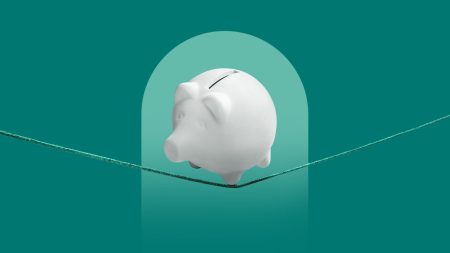Key takeaways
- Debt settlement may help borrowers manage overwhelming debt by negotiating a reduction in the amount of debt owed.
- You can negotiate directly with creditors or hire a debt settlement company to work with creditors on your behalf.
- Settling debts will almost require you to have a low credit score, which can make it more difficult to qualify for loans for years after the settlement. You may want to consider alternatives first.
Are you feeling overwhelmed by debt? You’re not alone! The average American holds a debt balance of around $100,000. Fortunately, with this being such a common problem, creative solutions have emerged to help you get your debt under control.
One such option is debt settlement, which is when borrowers negotiate with creditors to reduce the amount owed. This is a last resort option, generally best used if bankruptcy is not an option. Creditors may be willing to forgive a portion of your debt in exchange for a large lump-sum payment. However, debt settlement has long-term consequences. It can take years that you otherwise could have used to build your credit score and in the end, with taxes and fees, you might not save any money.
How does debt settlement work?
Debt settlement involves contacting each of your creditors to negotiate a payoff for less than the amount owed.
For example, let’s say you have a $10,000 credit card balance, but the interest rates are so high or your income is so low you fear you might never pay it off. You’ve already looked into a debt management plan or asked about hardship programs. Maybe you’ve considered bankruptcy but have a reason you can’t or shouldn’t do it. In that case, you might ask your credit card company if they will accept a $6,000 debt settlement. In this case, you would pay $6,000 to have the credit card company forgive the other $4,000.
However, it’s more complicated than that. Negotiating can take years, and during that time, your creditor could decide to sell your debt to a collection agency instead. During that time, your debt is also going to increase with late payments and growing interest.
Why would the creditor agree to reduce the amount owed?
Creditors know that if you can’t cover your debt payments, you may be forced to default or even file bankruptcy. If your debt is discharged in bankruptcy, the creditor might never be repaid. So, they may be willing to work with borrowers in financial distress to recover some of what they are owed.
Creditors won’t negotiate unless you are behind on payments because this indicates true financial hardship. Unfortunately, missing payments will likely lower your credit score and you will incur late fees and penalties, adding to the amount you owe.
You also need to have cash available to offer a settlement. If you stop making monthly payments and set aside money every month, you may have enough saved to propose a settlement in a year or two. But it’s important to remember that interest and penalty fees may be adding to your balance and not paying for a year or two will result in poor credit.
What happens after a debt settlement?
The settlement should be agreed to in writing. It will be recorded on your credit history, which can negatively impact your credit score for seven years following the settlement. By the time you get to the point of a settlement, your credit score will be at rock bottom, and then you’ll have years of it affecting your credit.
You can repeat the process with each creditor you feel you cannot repay in full. However, debt settlement only applies to unsecured debt. Mortgages (which are secured by the home) and auto loans (which are secured by the vehicle) cannot be settled. If you cannot repay a secured debt, the lender will likely foreclose or repossess the asset.
Hiring a debt settlement company vs. DIY debt settlement
If the process of settling debt with multiple creditors or debt collection agencies sounds overwhelming, professionals can help. A debt relief company (also called a debt settlement company) can handle negotiations for you.
When working with a debt relief company, you typically stop paying your creditors and make monthly payments to the debt relief company instead. Your payments will be held in a special savings account until there is enough money for the debt settlement company to offer a lump-sum payment to the creditor(s). The money in this account will also be used to cover the debt settlement firm’s fees.
Established debt relief companies have negotiated many settlements and have relationships with major debt collection agencies and creditors. With their insider knowledge, negotiation skills and connections, they may be able to negotiate a better deal than you could alone.
That said, choosing a reputable debt settlement company is critical. Debt settlement is a largely unregulated industry, so it’s important to do your research to help you avoid debt relief scams.
Pros and cons of debt settlement
The potential benefits of debt settlement include:
- Forgiven debt: If you don’t have to pay the balance in full, you may be able to get out of debt faster.
- Getting out from under your debt: Excessive debt or high-interest debt can be mentally and emotionally draining.
- Getting rid of or avoiding collections: Debt settlement shouldn’t be your first choice. If it helps you avoid having accounts sent to collections, it may be worth it. However, many accounts will be sent to collections in 90 to 180 days, which is about the time you’d need to be behind before a creditor would consider a settlement.
However, there are a few downsides to consider before proceeding with debt settlement:
- Account closures: The creditor will often automatically close the account once it’s settled. This means you would no longer have access to this credit line. Closing the credit line can also add another small hit to your credit score by reducing the age of your average active credit line and overall available credit.
- Cash requirement: You need cash to offer the creditor, but a lack of cash is probably part of your financial trouble. This is why borrowers in a debt settlement program stop making their debt payments and focus on saving money to offer a settlement instead.
- Inflated debt: Because of fees from debt settlement and not paying, debt usually increases as part of the process.
- Lower credit score: Between the missed debt payments and the settlement itself, which can stay on your record for seven years, your credit score will suffer. This could make it difficult to secure funding to get a new car, buy a home or even get a new credit card.
- No guarantees: Debt settlement isn’t guaranteed to work. You could spend a long time negotiating and not be successful. You’ll still be behind on payments and see your credit score continually decrease.
- Potential tax liability: The IRS generally considers canceled debts as taxable income. So, for example, if you have $4,000 of credit card debt forgiven, you’d need to report that amount as income on your tax return. However, there are IRS exceptions and exclusions to this rule, so you may want to contact a tax professional if this is a concern for you.
Steps to negotiating debt settlement
Whether you decide to negotiate a debt settlement on your own or through a debt relief company, there are six basic steps to negotiating a debt settlement.
1. Verify the debt
Before contacting creditors, you should confirm how much you owe and to whom. Create a list of your creditors and how much you currently owe each of them.
Your credit report might not list all your debts. As of April 2023, any medical debts with an initial balance under $500 are no longer included on U.S. credit reports. Plus, older debt past the seven to 10-year deadline could still be reported to collections.
If you can’t track down an older debt, contact the creditor or look through old bills. Keep in mind that most states have a statute of limitations that dictates how long a debt collector can pursue you for overdue debt.
2. Decide how much you can pay
Take inventory of your available funds. Total your checking accounts, savings accounts and any other cash you have available. Then ask yourself how much cash you can offer without depleting your emergency fund.
Take a look at your budget. How much can you realistically save each month for a settlement?
Use these figures to come up with a proposal for each creditor. It’s generally a good idea to start with a lower offer than you’re able o pay, as this will leave room for negotiations.
If you are working with a debt settlement company, they can help you come up with a payment plan.
3. Contact the creditors
Now it’s on to the hardest part of debt settlement: calling your creditors with a debt settlement offer.
The first thing to do is ask about hardship programs or a repayment plan. Creditors are far more likely to agree to these, and they will allow you to have a better credit score.
Again, your creditors aren’t going to consider negotiating unless you’re behind on payments. Collecting a portion of your outstanding debt is better than collecting none.
Prepare for some back and forth once you present your offer. You may need several phone calls or emails before the negotiations are complete.
4. Complete the deal in writing
Once you’ve reached a debt settlement agreement, send a letter to your creditor detailing the terms of the agreement. Include the settlement amount and note that the creditor is accepting that amount to cover the full debt.
Confirm that this letter is approved in writing before making your payment.
5. Make your payment
Send the funds to your creditor well before the due date to avoid any issues. Do not provide your bank account information. While it is illegal for debt collectors to deduct money from your bank account without permission, unscrupulous debt collectors could potentially take more than agreed if granted access to your account.
If you’re working with a debt settlement agency, it will make the payment for you from the savings account into which you have been paying. The agency will also take its fee for service from this account once the debt is settled.
6. Follow up with the credit bureaus
Whatever the terms of your agreement, check your credit report after you’ve made your payment to make sure your creditor reported your payment as agreed. You can get a free copy of your credit reports from AnnualCreditReport.com.
If there is an error on your report, contact the credit bureaus to correct the mistake or use a credit repair company for help.
Alternatives to debt settlement
If debt settlement seems too extreme, consider the following alternatives:
- Debt consolidation: Debt consolidation allows you to borrow a lump sum to pay off your current debts. Ideally, debt consolidation leaves you with just one manageable payment toward the debt consolidation loan. If you’ve been making the minimum payments for your credit cards on time and your credit score is good to excellent, you may explore debt consolidation options. For instance, you can use a personal loan or a credit card with a 0 percent introductory APR on balance transfers to pay off your debt and replace it with a more manageable loan.
- Debt management plans: With a debt management plan, a credit counselor evaluates what you’re able to afford and negotiates with your creditors for reduced monthly payments, lower interest or waived fees and penalties. You make monthly payments to the credit counseling agency, which pays your creditors per the terms of the agreement.
- Bankruptcy: Some people think bankruptcy is the worst-case scenario for your finances and credit, but debt settlement can be worse long term. In many cases, bankruptcy is a better option.
The bottom line
Debt settlement may allow you to pay a lump sum rather than the full amount you owe, but the risks and additional expenses should be considered. If you’re a strong negotiator with a clear plan, you can propose debt settlements directly to your creditors. Otherwise, consider a reputable debt settlement company to potentially save time and stress. Before committing to a debt relief company, research to confirm it’s a legitimate service with satisfied customers.
While debt settlement can provide much-needed relief from debt, it can negatively affect your credit and result in an unexpected income tax increase. Weigh these consequences against the money you could save and proceed with caution.
Read the full article here










